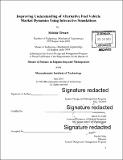Improving understanding of alternative fuel vehicle market dynamics using interactive simulations
Author(s)
Tiwari, Shishir
DownloadFull printable version (24.05Mb)
Alternative title
Improving understanding of AFV market dynamics using interactive simulations
Other Contributors
Massachusetts Institute of Technology. Engineering Systems Division.
Advisor
David R. Keith.
Terms of use
Metadata
Show full item recordAbstract
Interactive management flight simulators are becoming increasingly common as a tool for teaching key concepts in management and related fields. Advocates of flight simulators suggest that the active engagement of students with experimentation and game play may even lead to enhanced systems thinking capabilities. Through this thesis, I undertake an experiment to test this proposition, recruiting respondents from Amazon's Mechanical Turk online workforce. Using a three-group pretest-post-test design, I randomly assign respondents to complete one of the following: a) Read a report describing the results of the simulator, including actual screenshots from the simulator, to convey the same information about the AFV market in a conventional style (the control group). b) Undertake tasks using an interactive management flight simulator about the diffusion of alternative fuel vehicles given instructions but no results (treatment one) and c) Undertake the same tasks using an interactive management flight simulator about the diffusion of alternative fuel vehicles, with the aid of the report that also explains the results expected (treatment two). The simulator was built on several key concepts of system dynamics applied to alternative fuel vehicle market: the concept of consumer acceptance, platform utility, stocks and flows and the effects of time delays in a system's behavior. The results of this experiment demonstrate that the groups which used simulator (treatment 1 and 2) developed at least similar and in some cases, better understanding of the AFV market dynamics. I conclude that simulators can be an effective way to teach complex system dynamics principles and socio-technical interactions.
Description
Thesis: S.M. in Engineering and Management, Massachusetts Institute of Technology, School of Engineering, System Design and Management Program, Engineering and Management Program, 2016. Cataloged from PDF version of thesis. Includes bibliographical references (pages 67-70).
Date issued
2016Department
Massachusetts Institute of Technology. Engineering and Management Program; System Design and Management Program.Publisher
Massachusetts Institute of Technology
Keywords
Engineering and Management Program., System Design and Management Program., Engineering Systems Division.